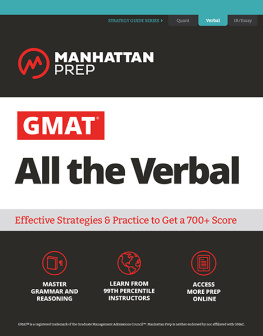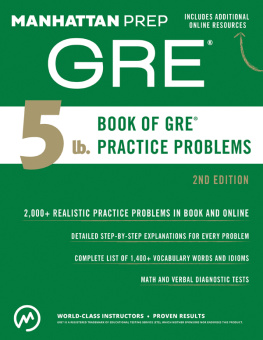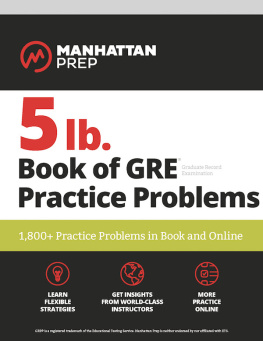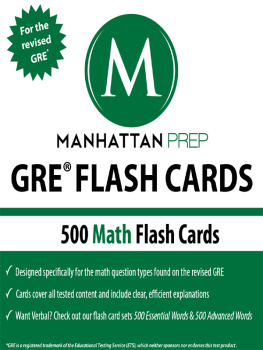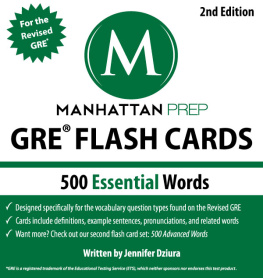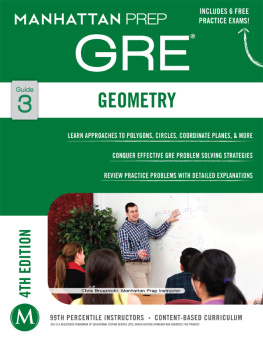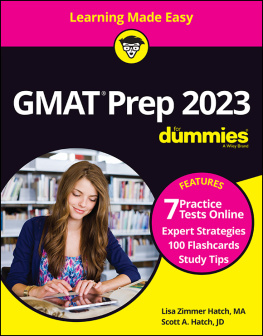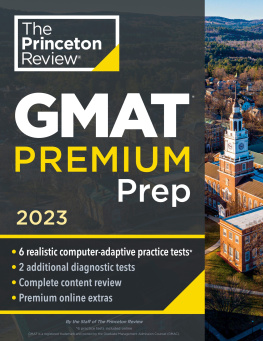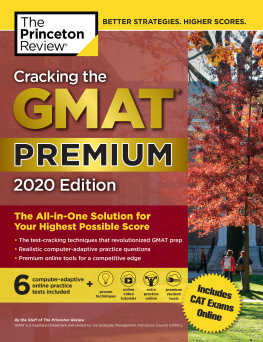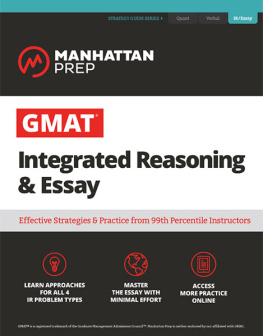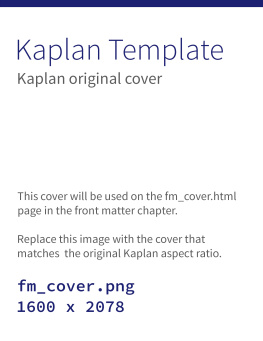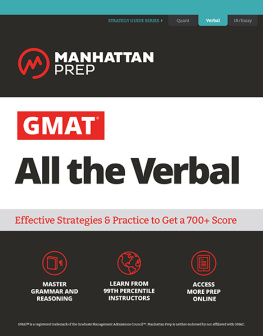
Acknowledgements
A great number of people were involved in the creation of the book you are holding.
Our Manhattan Prep resources are based on the continuing experiences of our instructors and students. The overall vision for this edition was developed by Stacey Koprince and Andrea Pawliczek, who determined what strategies to cover and how to weave them into a cohesive whole.
Stacey Koprince (SC, RC), Andrea Pawliczek (CR), and Daniel Fogel (SC) were the primary authors; they were supported by a number of content experts. Chelsey Cooley and Daniel Fogel served as the primary editors during the writing phase. Mario Gambino, Helen Tan, and Patrick Tyrrell served as a sounding board during the writing phase, vetting both ideas and content. Patrick Tyrrell deserves special mention as the source of multiple new ideas for the CR unit of the guide. Mario Gambino managed production for all images, with Derek Frankhouser and Israt Pasha lending their design expertise.
Matthew Callan coordinated the production work for this guide. Once the manuscript was done, Naomi Beesen and Emily Meredith Sledge edited and Cheryl Duckler proofread the entire guide from start to finish. Carly Schnur designed the covers.
Retail ISBNs: 978-1-5062-4904-9, 978-1-5062-6255-0
Retail eISBN: 978-1-5062-4905-6
Course ISBN: 978-1-5062-4906-3
Course eISBN: 978-1-5062-4907-0
Copyright 2019 MG Prep, Inc.
ALL RIGHTS RESERVED. No part of this work may be reproduced or used in any form or by any meansgraphic, electronic, or mechanical, including photocopying, recording, taping, or web distributionwithout the prior written permission of the publisher, MG Prep, Inc.
GMAT is a registered trademark of the Graduate Management Admissions Council. Manhattan Prep is neither endorsed by nor affiliated with GMAC.
GMAT Strategy Guides
Strategy Guide Supplements
Math
GMAT Foundations of Math | Verbal
GMAT Foundations of Verbal |
| GMAT Advanced Quant |
September 3, 2019
Dear Student,
Thank you for picking up a copy of All the Verbal. I hope this book provides just the guidance you need to get the most out of your GMAT studies.
At Manhattan Prep, we continually aspire to provide the best instructors and resources possible. If you have any questions or feedback, please do not hesitate to contact us.
Email our Student Services team at .
Our Manhattan Prep Strategy Guides are based on the continuing experiences of both our instructors and our students. The primary authors of the 7th Edition All the Verbal guide were Stacey Koprince, Andrea Pawliczek, and Daniel Fogel. Project management and design were led by Matthew Callan, Mario Gambino, and Helen Tan. Id like to send particular thanks to instructors Chelsey Cooley, Emily Meredith Sledge, and Patrick Tyrrell for their content contributions.
Finally, we are indebted to all of the Manhattan Prep students who have given us excellent feedback over the years. This book wouldnt be half of what it is without their voice.
And now that you are one of our students too, please chime in! I look forward to hearing from you. Thanks again and best of luck preparing for the GMAT!
Sincerely,
 Chris Ryan
Executive Director, Product Strategy
Manhattan Prep |
www.manhattanprep.com/gmat 138 West 25th Street, 7th Floor, New York, NY 10001 Tel: 212-721-7400 Fax: 646-514-7425
TABLE OF CONTENTS
The GMAT Mindset
The GMAT is a complex exam. It feels like an academic testmath, grammar, logical reasoningbut its really not! At heart, the GMAT is a test of your executive reasoning skills.
Executive reasoning is the official term for your ability to make all kinds of decisions in the face of complex and changing information. It makes sense, then, that graduate management programs would want to test these skills. Its crucial for you to understand how they do so because that understanding will impact both how you study for the GMAT and how you take the test.
You do need to know various math and grammar facts, rules, and concepts in order to do well on the GMATand this makes the test feel similar to tests that you took in school. Theres one critical difference though: When your teachers gave you tests in school, they tested you on material they expected you to know how to handle. Your teachers wouldnt put something on the test that they expected you to get wrong. That would be cruel!
Well, it would be cruel if the main point of the exam was to test your mastery of those facts, rules, and concepts. But that isnt the main point of the GMAT. Rather, the GMAT wants to know how well you make decisions regarding when to invest your limited time and mental energyand when not to.
In other words, the GMAT wants to know how you make business decisions. And no good businessperson invests in every single opportunity placed in front of them, just because its there. A good businessperson evaluates each opportunity, saying yes to some and no to others. Thats what youre going to do on the GMAT, too. Youll invest in a majority of the problems presented to you, but you will say no to somethe ones that look too hard or seem like theyll take too long to solve. These are literally bad investments.
So, the GMAT will offer you questions that it thinks you will not be able to do. How does it accomplish this? The GMAT is an adaptive test; that is, it adapts to you as you take it, offering easier or harder questions based on how youre doing on the test. Ideally, youll do well on the material that you know how to answer in a reasonable amount of time. Your reward? Youll earn questions that are too hard for you to doeither theyll take too long to answer or theyll be so hard that you wouldnt be able to do them even if you had unlimited time.
Then what? If you try to use a school mindset on the test, youll keep trying to answer the questions even though you really cant do them. Youll waste a bunch of time and then, later, youll have to rush on other questions. As a result, youll start to miss questions that you actually do know how to answer and your score will go down. This is the business equivalent of spending most of your annual budget by August...and then not having enough money left to run the business well from September through December.
Instead, use your business mindset to carry you through the exam. When the test finds your limit, acknowledge that! Call it a bad investment and let that problem go (ideally before youve spent very much time on it). Choose an answer, any answer, and move on.
Extend the business mindset to your studies as well. If there are certain topics that you really hate, decide that youre not going to study them in the first place. Youre just going to bail (guess quickly and move on) when one of those opportunities comes up. (One caveat: You cant bail on huge swaths of content. For example, dont bail on all of grammar; that represents too great a portion of the Verbal section. You can, though, bail on a subset of grammarsay, pronouns and idioms.)
Next page
